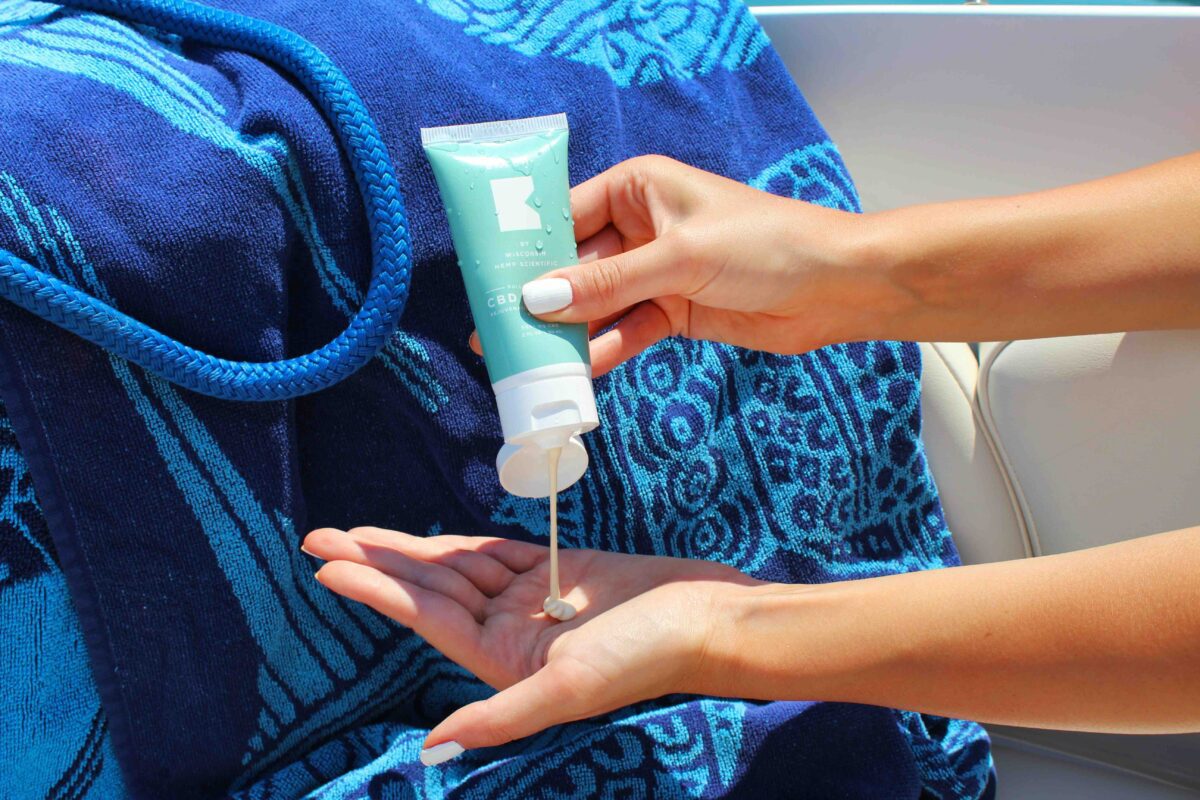
Photo by BATCH by Wisconsin Hemp Scientific
Skin cancer affects millions of Americans every year. With upcoming warm weather and frequent trips to the beach, it’s important to take precautions to protect yourself from the sun.
May is Skin Cancer Awareness Month, and we have the info you need to help protect you and your family.
What is skin cancer?
Skin cancer arises when skin cells grow too quickly for the body. Those cells become damaged down to the DNA, which creates mutations. Mutations in the body’s skin cells create tumors and lesions on the skin’s surface.
The most common forms of skin cancer are called basal cell carcinoma (BCC), squamous cell carcinoma (SCC), and melanoma. Another form, Merkel cell carcinoma (MCC), is a rare, yet aggressive, type of skin cancer.
Skin cancer can be deadly, and affects nearly 1 in 5 American adults every year. That’s why Skin Cancer Awareness Month is so important.
What causes skin cancer?
Constant damage from ultraviolet rays (UV rays) from the sun or indoor tanning beds are the two most common causes of skin cancer.
After many years of sun damage, skin blemishes, small tumors, and abnormal moles appear. If skin cancer is detected early, the chances of complete recovery and little scarring on the skin are possible.
What does it look like?
Depending on the location of harmful tumors, the patient’s skin color, and other factors, various types of skin cancer can look different from person to person.
To see examples of skin cancer in patients, visit the Skin Cancer Foundation’s website for photos.
More to know about melanoma
Melanoma is a type of skin cancer that develops in existing or new moles. The disease can either make an existing mole darker or create a new, almost black mole on the skin.
Some of the first signs of melanoma are if a mole changes in size, shape, or color, or if you find a new one that appears irregular. Melanoma is the deadliest kind of skin cancer, and spreads very quickly, often affecting the lungs, liver, and other vital organs. These factors make it crucial to check up on your moles and ensure they are normal.
How to prevent skin cancer
While it can be jarring to receive a skin cancer diagnosis, it’s important to note that with early detection and treatment, most skin cancers are curable. There are also certain precautions you can take to minimize your risk of developing skin cancer.
MyHealthfinder suggests:
- Avoid times where the UV count is highest, about 10 a.m. to 4 p.m.
- If you must be outside during this time, cover up with sleeves, pants, hats, etc.
- Also use sunscreen over 15 spf, and reapply every two hours
- Do not use harmful tanning practices, like indoor tanning machines
- Regularly check for abnormal moles, concerning patches of skin, etc.
What to do if you think you’ve developed skin cancer
Virginia has many dermatology and skin cancer facilities specializing in diagnosing and treating various skin-based cancers.
If you’re concerned that you or someone you love might have a form of skin cancer, here are some of the multiple facilities throughout the commonwealth that can provide more information:
- Skin Surgery Center of Virginia (Richmond)
- Skin Cancer Center of Northern Virginia (Lansdowne)
- Virginia Dermatology and Skin Cancer Center (Norfolk)
- UVA Health Melanoma and Skin Cancer Care (Charlottesville)
- Carilion Clinic (Roanoke)
- Ballad Health Cancer Center (Abingdon)
- Braun Dermatology (Alexandria)
Support Our Cause
Thank you for taking the time to read our work. Before you go, we hope you'll consider supporting our values-driven journalism, which has always strived to make clear what's really at stake for Virginians and our future.
Since day one, our goal here at Dogwood has always been to empower people across the commonwealth with fact-based news and information. We believe that when people are armed with knowledge about what's happening in their local, state, and federal governments—including who is working on their behalf and who is actively trying to block efforts aimed at improving the daily lives of Virginia families—they will be inspired to become civically engaged.


Spanberger rolls out policies to lower costs of prescription drugs, health coverage
The Democratic nominee struck a contrast between her goals to make health care more affordable in Virginia and Congressional Republicans who are...

Republican cuts to Medicaid and SNAP could leave Virginians without critical care and food assistance
Proposed budget cuts threaten access to essential services for low-income families, seniors, and people with disabilities across Virginia. House...

Virginia Dems to Sears: Reproductive rights should not be ‘political’
Virginia Democrats are pushing back on recent comments from Lieutenant Governor Winsome Earle-Sears saying the focus on defending the right to...

UVA Health tops Newsweek’s 2025 hospital rankings
UVA Health University Medical Center ranked No. 1 in Virginia and among the top 50 nationally in Newsweek’s "World’s Best Hospitals 2025." The...

Opinion: Black mothers of our commonwealth deserve better
When I became a mother of twin boys in Virginia, joy and fear walked hand in hand. The fear wasn’t irrational. The fear was rooted in the data, in...

Virginia health care advocates join Capitol Hill rally against Republican spending cuts
“The consequences are really high across the nation but particularly in Virginia with Medicaid expansion going away immediately if there’s that...





